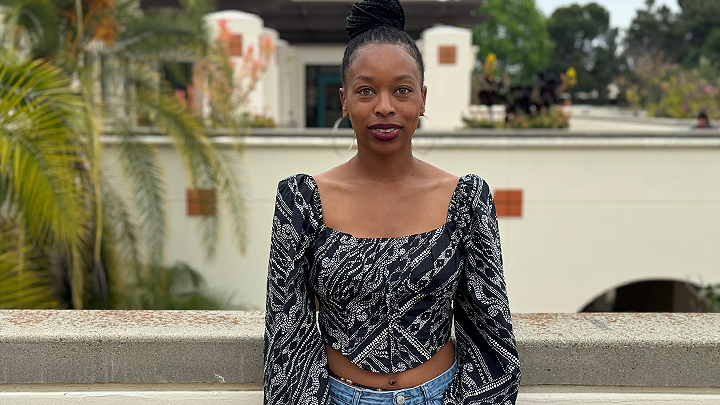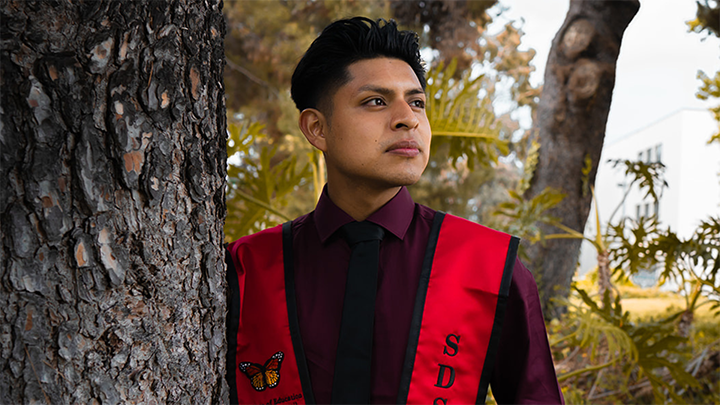Grad Profile: Jamilah Little is reaching her goal
SDSU psychology major overcomes a timeout, returns to school with support of her campus friends and groups.

When Jamilah Little arrived at San Diego State University in 2018, her goal was straightforward: get her degree and use education as a way to escape the instability of her upbringing.
But two years into her studies, her and her peers’ lives were rocked by the COVID-19 pandemic, which upended traditional campus life as students shifted to remote studies for more than a year.
Overwhelmed by the isolation, Little took a leave of absence from school, which deferred her dream and injected uncertainty into her future. She stayed in San Diego but admits she almost lost the drive to return to the campus 15 minutes away.
“The social isolation, everything being virtual, I didn’t want to do that,” Little said. “I almost didn’t come back.”
The operative word is almost.
Buoyed by a strong will to see her educational goals through and encouragement from her SDSU support network, Little returned to campus in fall 2021 and graduated with a bachelor’s degree in psychology in fall 2023. She will receive her diploma at Commencement this week.
“I wasn’t going to let all that hard work that I did go to waste,” said Little, who is completing a 200-hour trauma-informed yoga certification and a nutritionist program. She wants to pursue yoga and nutrition for her career.
“Even though college was challenging at times, I really enjoyed the experience.”
One of the groups Little credits with getting her back on track was the SDSU Guardian Scholars Program — a program under the Office of Educational Opportunity Programs, Outreach and Success that provides support to students who are current or former foster youth or wards of the court, have been under legal guardianship or are unaccompanied homeless youth.
Little was placed in the foster system at age 13, when she was removed from her mother’s home and taken in by her maternal grandmother, another stabilizing influence in her life.
“Guardian Scholars was one of my biggest encouragers, because that is their mission,” Little said. “They were in my corner, and they let me know they were there for me, and with their encouragement and encouragement from my counselors and peers, I was able to finish what I started.”
Little loved attending the monthly Scholars meetings, where she connected with people and learned more about foster youth resources, and the group’s mindfulness workshops, which helped her learn techniques to improve her health and well-being.
Bryan Spencer, the program’s assistant director, said Little’s example highlights how profound the work of Guardian Scholars can be.
“We feel privileged when students remain open for support and guidance,” Spencer said. “We are committed to each and every student and believe they not only have the ability to succeed, but to thrive at SDSU with the appropriate amount of guidance, motivation and know-how.
“Jamilah's experience is one example where a mutual partnership exists between a student and the program, and the outcome is beautiful. We have appreciated so many of these outcomes, but our squad always yearns for more,” Spencer said.
During her time on campus, Little said she forged lifelong bonds and found spaces that helped foster her sense of belonging on campus, such as the Student African American Sisterhood and the Afrikan Student Union.
“These spaces were safe spaces for me to thrive and receive supplemental support during my time on campus,” said Little, who works as a youth leader and volunteered teaching students nutrition and health sciences at an independent pan-African school during the pandemic.
Little also felt a profound sense of ancestral duty to graduate.
“When I got my diploma, it took a couple of weeks to really set in, and it hit me that I accomplished it,” she said. “I sent a picture of it to my grandmother, and she sent me a picture back celebrating. That meant the world to me, because I would think about my grandmother and my history and how education is pretty much the way out. My ancestors for a long time were denied the right to read. I felt like I couldn’t afford to be complacent or be a stereotype and let my ancestors down, or let God down, or myself down or my grandmother down.”




